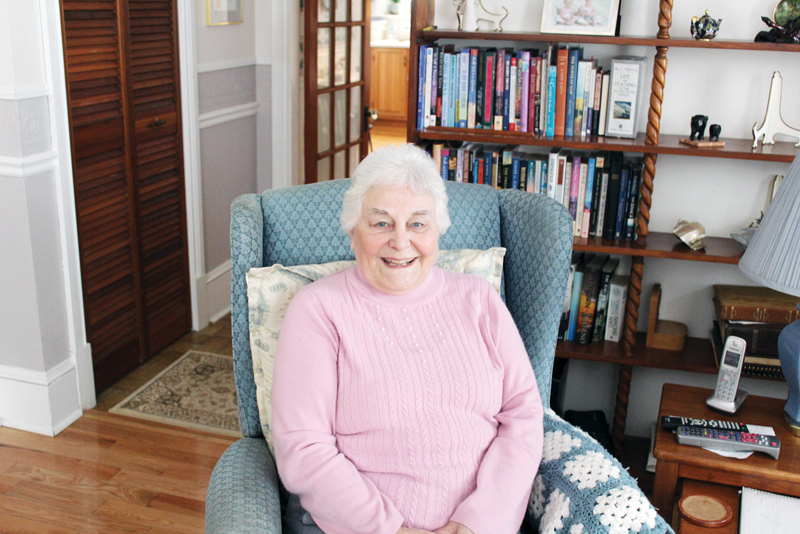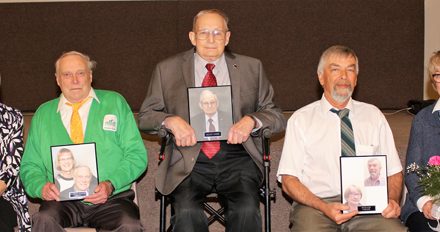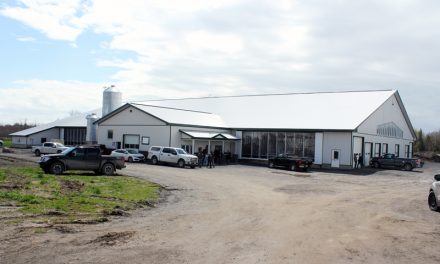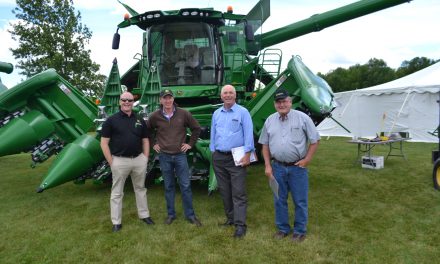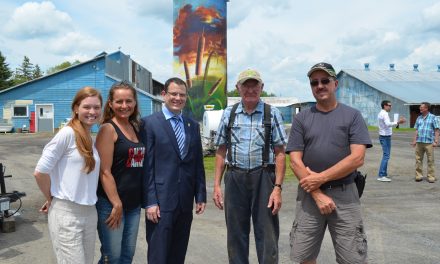North Dundas resident Diane Harkin is pictured in the front parlour of her residence where she has lived since purchasing the farm with her husband in 1970. Harkin also worked as a rural correspondent for newspapers and magazines. Thompson Goddard photo
NORTH DUNDAS–A very special gathering was held at the home of Diane Harkin in North Dundas, in early January when she launched her first book They Said We Couldn’t Do It – The story of a quiet revolution. Included in the group assembled were several members of an organization formed by Harkin and Ghislaine Brassard in the mid-70’s called Women for the Survival of Agriculture (WSA) – Winchester.
Harkin, who had been warned by her grandmother not to marry a farmer, began her agricultural journey while living in Toronto; when a co-worker of her husband Dan, ignited an interest in the rural life-style. The couple began searching for a farm to purchase in the Toronto area, but it was after moving to Ottawa that they finally purchased a farm in 1970; where she now resides.
Moving from the city to the country was an interesting experience for the young family with Harkin mentioning that neighbours would explain to the new arrivals how one didn’t hang out laundry or do farm work on Sunday. In her book she recalls a neighbour explaining that an invisible brick wall was built around their farm when they moved in and it would take many years to take it down.
Harkin attended an Ontario Federation of Agriculture convention with her husband and became inspired by Laura Heuser, who addressed the convention regarding the WSA in Michigan State. Supported by her husband and other WSA organizations in the United States, Harkin met with Brassard and the WSAW was conceived as the two women sat at Harkin’s kitchen table. Shortly after this meeting, Harkin’s husband, then president of the Dundas Federation of Agriculture, provided her with five minutes to speak on the WSAW during a DFA dinner and dance at North Dundas District High School; with several women joined the organization later that evening.
The goal of the WSA was to provide an opportunity for farm women to meet and to discuss farm issues, and as Harkin commented during a recent interview with AgriNews, “to laugh away your troubles”. The WSA eventually had several chapters in this country with approximately 2,000 members across Canada before it disbanded in 1984 due to the organization achieving “everything [they] set out to achieve”.
During the 2019 Chesterville and District Agricultural Society AGM held on Jan. 27 at the Nelson Laprade Centre in Chesterville, Harkin provided members with some of the accomplishments of the Women for the Survival of Agriculture; these included changes to the income tax law so that women were able to claim a portion of the farm income. As such, they would be recognized as partners with their husband, when applying for farm grants and locally assisted in furthering the education of women in agriculture; by partnering with Kemptville College of Agriculture Technology, which assisted in the establishment of the T.R. Leger School and Naomi’s House in Winchester. She also spoke about the holding of the first national farm conference for women in Ottawa. She explained that there were six papers on farm issues presented at the event that included government ministers, who had been provided the papers beforehand; they came to the conference with solutions to some of those issues. This resulted in greater media coverage of the issues facing women on the farm. Harkin presented Carol Johnson, daughter of WSA member Marilyn Johnson, with a WSA pin which had been designed by her mother.
When asked why she wrote this book, Harkin mentioned that she felt it was important for people to learn the history of how the role of farm women in the agricultural field had changed. Unlike many of their predecessors, farm women today can claim a salary for their work on the family farm, they have more opportunity for agricultural education, are more involved in farm politics as well as being more aware of their rights. It is Harkin’s hope that farm womens’ contributions to the success of the family farm garners more respect than in previous generations.
Harkin’s book includes profiles of several WSAW members, a list of the successful WSAW community initiatives and a chronology “of accomplishments and events in the Canadian Farm Women’s Movement”. She has produced a written record of her memories of women in agriculture and how it has changed in the last few decades as well as providing the reader with an opportunity to view a successful grassroots organization that resulted in improving the socio-economic life of women on the farm.
She mentioned in passing how the torch is being given to the next generation to ensure the contributions of farm women are acknowledged.
They Said We Couldn’t Do It is available for purchase at Winchester Print, the Morrisburg or Chesterville Law Offices of Cass, Grenkie, Remillard, can be ordered at quietrevolutionbookorder@gmail.com for $25 and is available at all six branches of the SDG County Libraries.

